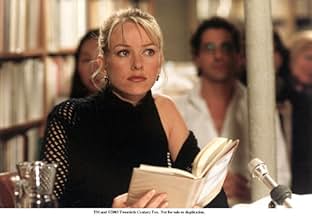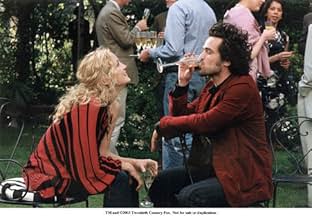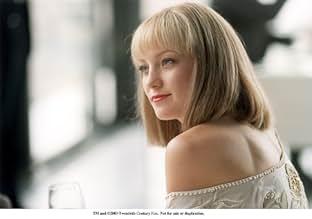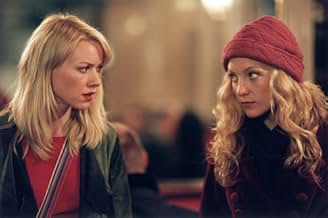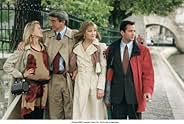Le divorce
- 2003
- Tous publics
- 1h 57m
IMDb RATING
4.9/10
12K
YOUR RATING
French vs. American social customs and behaviors are observed in a story about an American visiting her sister and French brother-in-law and niece in Paris.French vs. American social customs and behaviors are observed in a story about an American visiting her sister and French brother-in-law and niece in Paris.French vs. American social customs and behaviors are observed in a story about an American visiting her sister and French brother-in-law and niece in Paris.
- Director
- Writers
- Stars
- Awards
- 2 wins total
- Director
- Writers
- All cast & crew
- Production, box office & more at IMDbPro
Featured reviews
I think this could have been an interesting film. Instead, it shows the French as being close-minded, rude and arrogant with no concern about other people's feelings. The American sisters are annoying in their lack of backbone. Instead of standing up for themselves or each other, they simply lie down and let husbands, boyfriends and in-laws humiliate them. Their last name should be doormat. The scenery is both beautiful and breathtaking. The restaurant scenes gives us some insight on the French artfulness of food. Dining is not just a daily routine but an adventure of taste, color and texture. Even when insulting, the French language is a pleasure to hear. Sadly, the bad heavily outweighs the good in this movie.
...because I LOVED this movie. I read the other reviews and I'm astounded. I think this is a great movie. I received the DVD for free, and was so pleasantly surprised by the acting, the scenery, the humor, the exaggerated French snobbishness. I thought Kate Hudson glowed, carrying most of the movie. I loved the lingerie store scene, where the French women giggled over Isabel being "le petite" when she showed them her chest. I loved how Naomi Watt's character was perpetually scowling until she met the handsome divorce lawyer, and visibly fell in love at first sight. Glenn Close was wonderful as the graceful, well-aged American writer, clearly bitter about her being dumped by Edgar, but over-compensating with sarcasm. I loved the scene in the police car, where they were going to investigate a murder, and got side-tracked by the police women's perfume. There are so many wonderful nuances that make this movie great, I don't even care that the plot was muddled and non-existent. It's visually wonderful to watch, and the acting is superb. It's the kind of movie girls like to watch on a weekend, doing their nails, just relaxing. It moves slow, but it's additive and I've watched it more than I'll admit...
"Le Divorce" fails. Despite the beauty of the locales and the talent of the lead actors, the director couldn't decide if this is a Parisian comedy or an adult tale of marital discord gone horrifically askew.
The interaction between the two female leads is good-half-sisters and true soulmates. But their romantic and marital complications come too fast with too little depth and the film is on a train wreck in the making.
And suave, affluent, cheating Frenchmen are a stale staple of these movies. Nothing new or interesting here.
Too bad.
4/10.
The interaction between the two female leads is good-half-sisters and true soulmates. But their romantic and marital complications come too fast with too little depth and the film is on a train wreck in the making.
And suave, affluent, cheating Frenchmen are a stale staple of these movies. Nothing new or interesting here.
Too bad.
4/10.
The performances are terrific, Kate Hudson proves that she is the actress that Goldie Hawn never was, and it is always good to see Leslie Caron looking her age and looking great. Now, the matter of the plot has been raised and the consensus so far is that it is a bag of clichés dumped into a blender and then poured out on film.
True. But, the book was no great shakes either and the screenplay simply has not risen above its origins.
I enjoyed Le Divorce for its cynicism and its predictability, frankly. It is nice every now and then to see a movie that elicits a sour chuckle rather than a guffaw or a shriek, and this is one of them.
True. But, the book was no great shakes either and the screenplay simply has not risen above its origins.
I enjoyed Le Divorce for its cynicism and its predictability, frankly. It is nice every now and then to see a movie that elicits a sour chuckle rather than a guffaw or a shriek, and this is one of them.
It's amusing to read some of the comments in this page of IMDb. Most postings place the blame for what they perceive as the failure of this picture on James Ivory, Ismael Merchant and Ruth Prawer Jhabvala, the successful creative team of some of the best movies of recent years. In fact, the sin they appear to have committed was to adapt the Diane Johnson's novel about the contrasts she has always written about between two cultures that should be more similar: the French and American, yet, as we read in the book, and now watched in the film, they are not as close as one would imagine.
First, the French one sees portrayed in the film belong to the high classes that are imbued in their traditions, savoir faire, their sense of style and being B.C.B.G., something the Americans, being somehow a new society without those traditions cannot comprehend. Money is a taboo subject to be spoken at all by the wealthy French, whereas in America the flaunting of having made fortunes and having millions is an everyday subject for the higher ups.
Ms. Johnson, who has lived in France for quite some time, is an observant of that society. In her many books about life in that country, the study in the contrasts she sees, are at center stage and the mixing of Americans with the French bourgeoisie produces surprising results that make the reading of her novels more compelling for the joy they bring to her readers.
Isabel, the young American, arriving to stay with her sister Roxanne, takes easily to the new surroundings. In doing so, she completely disregards the established rules when she enters in a liaison with Marc-Henri, who sees the occasion as one for amusing himself for a while. Roxanne, on the other hand, soon discovers what she is against when her French husband decides to ask her for a divorce. Little has prepared her for the consequences that go with it and the archaic laws about a couple's separation in that country, which benefits the husband while punishing the wife.
The other theme at the core of the story is a painting Roxanne has brought with her from San Diego. The possibility of it being a real Delacroix is now at the center of the divorce settlement. Where one can see it has nothing to do with the cheating husband, Suzanne, the mother-in-law deems otherwise because of the possible value the painting will fetch when it's sold.
Naomi Watts makes another great contribution in her appearance as Roxanne. Kate Hudson is not in the same league, although her good looks and natural charm makes one care more for her Isabel. The delicious Leslie Caron plays Madame de Persand with great panache. Just watching her remarking about the granulated sugar Charlotte offers her to sweeten her tea is one of the delights of the film. Tierry Lhermitte is seen as the callous Edgar. Glenn Close plays Olivia Pace, a writer,who might be Diane Johnson's alter ego in the story. Stephen Fry, Stockard Channing, Sam Waterston, and the rest of the French and American cast do a good job.
This film has a feeling of being more French than some French movies. The cinematography of Pierre Lhomme is wonderful as he takes his camera all over the city showing us what a treat it is to be in Paris, even for a visit. The other thing that comes across is the involvement of the late Ismail Marchant to the production. Mr. Merchant got great locales in where to film and had a great eye for the style of the pictures he was producing. His absence, alas, is sadly missed from the latest James Ivory project "The White Countess".
In spite of not being up to some of his best movies, James Ivory still shows he has a keen eye for presenting the material on the screen.
First, the French one sees portrayed in the film belong to the high classes that are imbued in their traditions, savoir faire, their sense of style and being B.C.B.G., something the Americans, being somehow a new society without those traditions cannot comprehend. Money is a taboo subject to be spoken at all by the wealthy French, whereas in America the flaunting of having made fortunes and having millions is an everyday subject for the higher ups.
Ms. Johnson, who has lived in France for quite some time, is an observant of that society. In her many books about life in that country, the study in the contrasts she sees, are at center stage and the mixing of Americans with the French bourgeoisie produces surprising results that make the reading of her novels more compelling for the joy they bring to her readers.
Isabel, the young American, arriving to stay with her sister Roxanne, takes easily to the new surroundings. In doing so, she completely disregards the established rules when she enters in a liaison with Marc-Henri, who sees the occasion as one for amusing himself for a while. Roxanne, on the other hand, soon discovers what she is against when her French husband decides to ask her for a divorce. Little has prepared her for the consequences that go with it and the archaic laws about a couple's separation in that country, which benefits the husband while punishing the wife.
The other theme at the core of the story is a painting Roxanne has brought with her from San Diego. The possibility of it being a real Delacroix is now at the center of the divorce settlement. Where one can see it has nothing to do with the cheating husband, Suzanne, the mother-in-law deems otherwise because of the possible value the painting will fetch when it's sold.
Naomi Watts makes another great contribution in her appearance as Roxanne. Kate Hudson is not in the same league, although her good looks and natural charm makes one care more for her Isabel. The delicious Leslie Caron plays Madame de Persand with great panache. Just watching her remarking about the granulated sugar Charlotte offers her to sweeten her tea is one of the delights of the film. Tierry Lhermitte is seen as the callous Edgar. Glenn Close plays Olivia Pace, a writer,who might be Diane Johnson's alter ego in the story. Stephen Fry, Stockard Channing, Sam Waterston, and the rest of the French and American cast do a good job.
This film has a feeling of being more French than some French movies. The cinematography of Pierre Lhomme is wonderful as he takes his camera all over the city showing us what a treat it is to be in Paris, even for a visit. The other thing that comes across is the involvement of the late Ismail Marchant to the production. Mr. Merchant got great locales in where to film and had a great eye for the style of the pictures he was producing. His absence, alas, is sadly missed from the latest James Ivory project "The White Countess".
In spite of not being up to some of his best movies, James Ivory still shows he has a keen eye for presenting the material on the screen.
Did you know
- TriviaThe painting sold before Roxy's LaTour is Claude-Joseph Vernet's "La Nuit, au Port au Clair de Lune", which is in the Louvre's permanent collection.
- GoofsWhen Isabel and Edgar have their last outing together, Isabel is clearly wearing red nail lacquer in the restaurant. When they say goodbye outside, her nails are no longer red.
- SoundtracksQu'est-ce qu'on Attend pour Être Heureux ?
Music by Paul Misraki
Lyrics by André Hornez
Performed by Patrick Bruel and Johnny Hallyday
- How long is The Divorce?Powered by Alexa
Details
- Release date
- Countries of origin
- Official sites
- Languages
- Also known as
- The Divorce
- Filming locations
- Production companies
- See more company credits at IMDbPro
Box office
- Gross US & Canada
- $9,081,057
- Opening weekend US & Canada
- $516,834
- Aug 10, 2003
- Gross worldwide
- $12,991,996
- Runtime1 hour 57 minutes
- Color
- Sound mix
- Aspect ratio
- 2.39 : 1
Contribute to this page
Suggest an edit or add missing content









